
Related
Guests
- Waad Al-KateabSyrian activist and director of the Oscar-nominated film, For Sama.
Syrian director Waad Al-Kateab talks about her new documentary, We Dare to Dream. The film follows young refugee athletes from Iran, Syria, South Sudan and Cameroon who competed together on the Refugee Olympic Team at the 2020 Tokyo Olympics. The film just premiered at the Tribeca Film Festival. Al-Kateab is a Syrian activist and director of the Oscar-nominated film, For Sama.
Transcript
AMY GOODMAN: This is Democracy Now!, democracynow.org, The War and Peace Report. I’m Amy Goodman, with Nermeen Shaikh.
We look now at a new film about the Refugee Olympic Team in the 2020 Tokyo Olympics. It follows young refugee athletes from Iran, Syria, South Sudan and Cameroon as they fight to compete. The documentary is called We Dare to Dream, and it just had its world premiere here in New York at the Tribeca Film Festival. It’s directed by Waad Al-Kateab, the Syrian activist and director of the Oscar-nominated, BAFTA-winning film, For Sama. In this clip from her new film, she introduces herself.
WAAD AL-KATEAB: My name is Waad. I’m one of millions of brave Syrians who fought for freedom. Many of us were killed, millions more forced to leave Syria, all by Assad and his allies. I became a refugee on a day like this five years ago.
These are our last few minutes in Aleppo. Just like a nightmare. Here, it’s my lovely house. No words can describe what I’m feeling now. We don’t want to — forced to flee out of our city.
I got this plant. It will grow out of Aleppo.
It’s still hard for me to realize we survived it. Filming was my way of fighting back. I film to protect my memories, to preserve the home I miss and to save the people I lost.
AMY GOODMAN: That’s Waad Al-Kateab in her new documentary, We Dare to Dream. This is another clip from the film, in which she talks to some of the refugee Olympic hopefuls.
WAAD AL-KATEAB: [translated] How would you feel if you were selected for the Tokyo Olympics Refugee Team?
WAEL AL-FARRAJ: [translated] First, the feeling would be indescribable, because it would be very special. The feeling of the Olympics…
ANJELINA LOHALITH: I have been really training hard, sacrificing a lot, so that I can get one more chance.
KIMIA ALIZADEH: Sometimes I want to give up, because I’m tired of fighting with everything. But now Olympics, it’s the big light in my life. And I want to show the light, show the sunshine, to my life, to Iranians, to all the refugees around the world.
CYRILLE FAGAT TCHATCHET II: I’d be very honored to be given the opportunity to represent all the underprivileged people around the world. You also need to showcase that refugees can also be athletes who can compete at the highest level.
WAEL AL-FARRAJ: [translated] It would mean I’d be representing a lot of refugees from all over the world, not just Syrians, but all the refugees. I’d be able to make their voice heard, their plight and all they’ve been through.
AMY GOODMAN: That’s a clip from the new documentary, We Dare to Dream, directed by Waad Al-Kateab, who joins us now from New York, though usually in London, because she was here for the premiere of We Dare to Dream at the Tribeca Film Festival.
Waad, it’s great to have you back on Democracy Now! Tell us more. We’re going to get into the larger issue of refugees in the world. But for those who don’t understand the significance of this Olympic team of refugees, introduce us to them.
WAAD AL-KATEAB: Yeah. Thank you so much. I’m very happy to be here again.
I think, you know, it’s something I learned through this two years of working with these athletes. This team and this film is about representation. It’s about being able to get out to the world and break all the stereotypes that people — you know, the labels that we usually attach to as refugees — even, you know, being here as a director, like a refugee director, you know, going out with these athletes into this amazing journey. These people are refugees who they were athletes before. Some of them, they just became athletes after they became refugees. So, it’s about representation.
You know, today, if you are an athlete or if you love sports, if you want to — like, if you’re good at sports and you want to play, the only possibility, before this team, was only to be with your national team. But what if you are stateless? What if you are someone like Wael, who lives in a refugee camp, who can’t be in Syria anymore. This team and these athletes, you know, have a new chance for them to be — represent not just only themselves, but represent people around the world, people who sometimes they don’t speak the same language, they’re not coming from the same culture, but they all share the same journey, which is, like, losing home and starting all over from a new place.
NERMEEN SHAIKH: So, Waad, could you tell us a couple of the stories, the refugee athletes who you profile in the documentary?
WAAD AL-KATEAB: Yeah, it was really amazing. And I’m very honored just to know them and to go with them with this. One of the stories is Wael, Wael who’s a Syrian refugee, who lives in Jordan. Wael came to the camp when he was 9 years old. He’s living in al-Azraq camp in Jordan, for like almost like 12 or 13 years. He grew up there. There’s no school. There’s no, like, fair opportunities. There is no education. The circumstances is really hard to live. And Wael got to learn taekwondo when he was around like 10 or 11. And it became his own ticket, you know, his own dream. And, you know, like, Wael was trying so hard. I don’t want to give away the film, but, like, his dream was to play in the Tokyo Olympics. This didn’t happen. But Wael didn’t give up, and he was trying to find a new way of this.
Another athlete was Kimia Alizadeh. She’s an Iranian athlete. She was the first female to win an Olympic medal in Iran, in any female sport in Iran. And she became like the face of so many Iranians. The Iranian government uses her win and uses her voice to, you know, like, advocate and fake so many things as happening in Iran, and they were using her. And she decided to stop that. She decided to leave. Kimia is representing, like, so many not just refugees today, so many Iranians who are in the street today, who are fighting for their rights and for their freedom.
We have also Cyrille, who’s a Cameroonian refugee in the U.K. His sport is weightlifting. Cyrille decided not to share why he became refugee. And I think this is like an important message and very personal choice. You know, like, today, sometimes when we meet people who left, even between us as refugees, like we always ask this as a first question, even before we know, like, more about them. You know, why did you became refugee? And I just wanted to make the point that, like, it’s not our right. Not everyone who left is ready to share and ready to go deep with, like, their emotion and their struggle and their situation.
We have also Saeid, who’s Iranian. He’s a canoeist. And he has a fascinating story. I hope people would know when they watch the film.
And the last one was Anjelina, who — she’s from South Sudan. She lives in Kenya today. She left her country when she was 7 years old. She has a boy who’s 4 years old now. And the story is a lot about sacrifice and motherhood and hope and the future.
AMY GOODMAN: So, Waad, if you can tell us, I mean, the significance of the Olympics allowing a team like this, a team of people who cannot go back home, who cannot represent their countries, the IOC Refugee Olympic Team? How did it get started?
WAAD AL-KATEAB: I mean, we’re talking about today, as we speak, like over 100 million displaced people around the world. This is more than any nation around the world, way more than like so many nations, as well. So, like, to be watching, like, high sport events like the Olympics, when you don’t feel represented — I, myself, you know, when I was at the Olympics with these guys, I watched the Syrian team going into the games, like carrying the flag, which, for me, no longer is my flag. It’s not something I can be represented with. But looking at the team and the amazing message they carry, like I, with people from Cameroon, South Sudan, Iran — sometimes we don’t even speak the same language — I feel represented, because there is something within the journey. There’s something within the experience that we witnessed. It’s the same. So, it’s about representation.
The team started as like kind of idea from the IOC, the Olympic Committee, and started in Rio in 2016, started with 10 athletes, who are refugees from, like, different countries. And we arrived to Tokyo with 29 athletes. And the hope now is to go to Paris with more, as well. I think it’s about representation. It’s about more seat on the table. It’s just something I feel is very important.
NERMEEN SHAIKH: And you’ve said, Waad, that the film is not so much about winning. It’s about how many times you fall, how many times the world fails you, and how many times you stand up and find your way. Could you explain?
WAAD AL-KATEAB: Yeah, I mean, it’s definitely about that. It’s not about winning. It’s not about even like the team itself. It’s about the legacy. It’s about representation. It’s not about sport, as much as it is about sport. I think when people would watch the film, they can definitely understand more. It’s about human being. It’s about how we find our way, even when that — when the circumstances is very hard.
And I think, you know, what we are witnessing around the world today, that our life could be flipped upside down at any second. You know, this week, early on, in New York, when you see the smoke, when you see the people — you know, like, anything could happen — climate change, war, hate speech and so many things — where any one of us could find themselves in the way that they lost everything, they lost their families, they lost their home, they lost their even, like, history, and sometimes even, like, dreams. And at that point, you know, it’s about how can you keep going, how can you wake up every single day finding your way forward, even when you’re really tired, if you — even when you feel like, “I can’t fight anymore.” So, people would watch these five amazing athletes, and they will understand exactly what and how we have to move forward.
AMY GOODMAN: Waad, let’s take this to a bigger stage, beyond sports, to the critical issue of the global refugee crisis, how many people we’re talking about, the number of people, for example, who die at sea, how different countries and blocs of countries are dealing with refugees, and what needs to be done.
WAAD AL-KATEAB: Yeah, I mean, it’s, like, really — it’s so complicated, and so much work needs to be done. And, you know, for me, like, my belief in this film and in this — guys, it’s not about sport. You know, it’s about what we can do after, like the impact we can do. It’s different, like, countries. It’s different issues, different policies. And I know that me, as a person, or like even us, as this film, we can maybe articulate or, like, go around all these countries, but we will do what we can do. And I really urge people, you know, to try to do their part, like, whether you are a refugee and you need to fight for your own right, whether you are, like, in your own country and you can do something. You know, you have to do something. This is no longer about others. We’re talking about something, again, you know, like, could happen at any second, after what we watched in Ukraine, after we saw all the Ukrainian refugees, like the Syrian refugees, the Afghan refugees, like so many other countries — like, I can keep counting for, you know, like five minutes, maybe. It’s about all of us, and it’s about the next and the future that we want to live in. There is a lot of work to be done. And I am now a refugee in the U.K. And to look at the U.K. policy now toward refugees, it’s something very shameful. And I think we have a lot to do.
At the second day after the premiere here, we went to — we visited three public schools in New York here, and just to see these athletes who, like, with the kids, you know, trying to tell their own stories. One boy, who’s 8 years old, stood up, and he said to Wael, who’s the Syrian refugee from Jordan, who doesn’t speak English — I was translating to him, you know, just to tell a little bit of his story to these 7- and 8-years-old kids. This 8-years-old boy stood up, and he said, like, “Can I translate? Can I help you translate for him?” Like, you know, this is about representation. People need to see themselves. They need to find more strength, and they need to have more help, in totally different circumstances. So, whether you are an individual who can look at the community and see what you can do within this, whether you are a decision-maker and you can really play an important role in shifting the rules, because it’s not good. It’s not right. It’s not fair.
NERMEEN SHAIKH: And, Waad, you fled — of course, you’re a refugee yourself. You fled Syria in 2016, having filmed all this footage during the uprising against the Assad regime, starting in 2011. If you could talk about how the situation in Syria has changed, and if, in any way, there are places that are now more receptive to refugees from Syria?
WAAD AL-KATEAB: Yeah, I mean, the situation is definitely not good at all. And it’s going worse and worse. We’re not just talking about 12 years of forcing people to leave and displacing people, attacking whole entire cities with weapons and arresting people and, like, for them to disappear for years, with torture, and being killed even under torture. We’re talking about renormalization and re-have relationship with Assad, the person who’s responsible for all this crimes across the years. He’s back in the Arab League now, and he was invited to the climate change conference. So, you know, there’s a lot of pushback.
And I think, you know, as a Syrian, as someone who survived all of this, as someone who witnessed all of this, as someone who don’t want to forget and don’t want to let it go, I think, you know, like, it’s very important to keep telling stories. It is about Syria, and it’s about other countries who are going through a lot, from what I’ve witnessed myself. Syria today is not safe. And that’s why I can’t even go back. And that’s why I think, you know, this film was very important for me to process that now I’m no longer there, I can’t be there, and I have to think about how can I fight to survive personally, you know, to find more strength and to be able to wake up every day with a new fight. I didn’t want to let everything happened. It happened. I’m still fighting for Syria. I’m still fighting for our rights all as refugees and as a human being, in living, in deserving to live and deserving to dream, as well.
AMY GOODMAN: I was wondering, Waad, if you’ve heard about this latest news about the U.S. military set to launch a formal investigation into a drone strike that the U.S. engaged in in May, they said, took out an ISIS leader. President Biden announced they had taken out this al-Qaeda — rather, a senior al-Qaeda leader, now acknowledging there may have been a serious mistake. And they are conducting a probe of how they ended up killing a civilian father of 10. Can you talk about the significance of this and the U.S. role right now in Syria?
WAAD AL-KATEAB: Yeah, I think, you know, like, the last 12 years carried definitely so much and so many mistakes, so many interfere from countries where they should not, and so many ignorance when they should, like, interfere and should help. What I can say, like, it’s very complicated, like, to articulate this, but I think it’s very important that justice include everything happened in Syria, whether it’s Assad regime, whether it’s ISIS, whether it’s other countries who committed crimes and, like, definitely, you know, like, harm and make people life like much harder and really difficult. So, I feel like, you know, it’s very important to look at all the details, from the big to the very little ones.
And what is very important today, it’s to remember that Syria, it’s not over. This is still happening. To look at Ukraine now and see, you know, how can we move forward with this, how can we let this not happen again. And unfortunately, it is happening again. It’s happening in Ukraine, and it’s still happening in Syria. And, you know, like, also, after the earthquake, the devastating earthquake that, like, hit Turkey and Syria again, with the ignorance of the international community of all these people who were under the rubbles, with leaving the White Helmets and other amazing people alone, facing, you know, all of this catastrophe. There’s so many things to be done, and everyone should take responsibility toward every single thing they were responsible for.
NERMEEN SHAIKH: So, Waad, what would you — before we conclude, what would you like to see the international community do with respect to Syria, in particular, to help those who have been displaced, both internally, of which there are millions, but also externally? And what do you see the way that the international community responded to the crisis — and I’m talking, principally, of course, about Europe and North America — the war in Ukraine, compared to the response to the war in Syria, which has, of course, been going on, as you said, now for 12 years?
WAAD AL-KATEAB: Yeah, I think, you know, since Ukraine, the invasion on Ukraine happened, and we were just — I mean, I can’t describe the right feeling on this, because, you know, we’ve been witnessing this for years. We’ve been trying to talk about it and tell people that we should act for this, because we don’t want any other country to go through this. And unfortunately, Ukrainians went, and they are still going through this again and again. And I see this not as a comparison of how the response and what should have been done and all of this. I see this as a new opportunity to connect, you know, and to do more for both countries, and for so many other countries who’s going through more, and, unfortunately, you know, like unfair situations.
In terms of Syria, and going back to where we are today, like, to reinforce that the main reason why we’re out, the main reason why I can’t go back to Syria today is Assad. Assad is still in power. There are so many countries who are supporting Assad today as if nothing happened. You know, we’ve heard in so many years about the red lines and the cutoff relationship and the isolating and the sanctions and all of this. And it seems like now going to be like more vague and more, like, not in the right place.
And then, you know, people also — like, I think international community and the U.N. and so many other, like, big bodies looking at refugees as they are the issue, or they are the problem. And I just wanted to make it very clear: We are not the problem. We are one of the consequences of four criminals, of climate change, of, like, hate speech. So, I really want people to understand, you know, like, they are looking at the result of the problem. They are not looking at the cause of the problem. And that’s exactly, I think, how we should shift the conversation today.
And, you know, this film, We Dare to Dream, it’s a new message of the world. It’s more like — I really, like, feel sometimes it’s very hard to explain, but it’s — at the same time, it’s very simple. We are not the issue. You know, we are consequences. And we should deal with the — not just the consequences. We should look at the main reason of the problem. And for this, I really want people to look at the film and to see themselves and to see others and to see the way out of all of this by humanity, by connecting to other people.
AMY GOODMAN: Waad Al-Kateab, we want to thank you so much for being with us, director of the new documentary, We Dare to Dream, which just premiered at the Tribeca Film Festival here in New York City. Waad is a Syrian activist and filmmaker, award-winning director of the critically acclaimed documentary For Sama. This is Democracy Now!, democracynow.org, The War and Peace Report. I’m Amy Goodman, with Nermeen Shaikh.

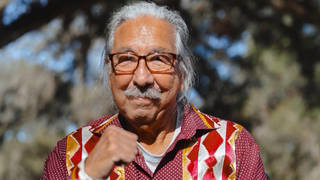
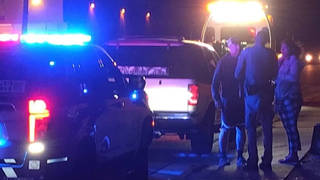
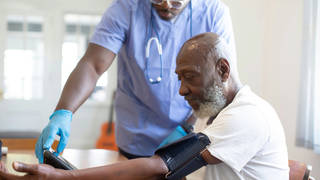
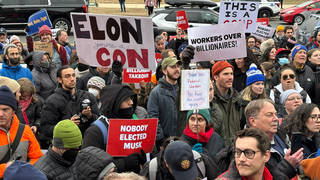





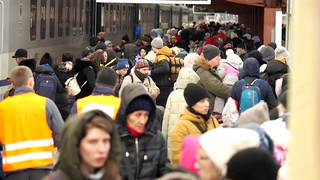
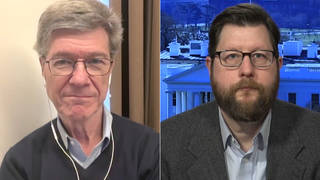
Media Options